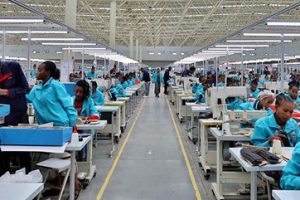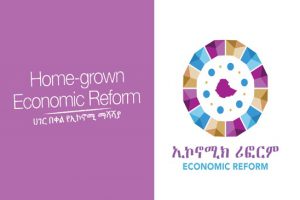
Export is the cornerstone to realize the 2025 plan of the country to join middle income country. To this end agriculture, manufacturing and mining sector pays significant role for the overall export progress of the country. Even though the export performance of the country showed increments from time to time the result doesn’t meet the desired goals according to the ministry of Trade and Industry.
Ethiopia gives due emphasis to the agriculture, mining and manufacturing sector such as textile and garment, leather and pharmaceuticals exports as sources of substantial foreign currency.The country’s export performance shows improvement but still much effort remained to boost the export performance of the country in all sector.
Ethiopia has secured 2.67 billion USD from export trade during the last Ethiopian budget year, according to Ministry of Trade and industry. The total revenue earned accounted to about 61.75 percent of the planned 4.32 billion USD for the fiscal year. Contraband, prices fluctuation in global market, lack of energy and quality of products as well as instability in some parts of the country are among the challenges faced the sectors performance.
According to him, the export of tantalum, pulses, oilseeds, and floriculture achieved over 75 percent of the target, while coffee, fish, electric power, textile and garment, vegetables and fruits, and tea fell from 50-74 percent.
On the other hand, meat, milk and milk products, spices, leather and leather products, food and beverages, honey, pharmaceuticals, minerals, live animals, chemical and construction inputs registered below 50 percent performance.
The country secured $USD 2.67 billion from export in concluded fiscal year 2019 and the country sends its products to 146 countries across the world. The top 10 importers of the Ethiopian exports were USA, Somalia, Netherlands, Saudi Arabia, China, UAE, Djibouti, Germany, Japan and Israel.
Improving the marketing system, supporting industrial parks to become operational, expanding infrastructures, controlling contraband, financing and logistics supply for export-oriented industries, among others, the next measures to be taken. The ministry plans to secure 4.69 billion USD from export this Ethiopian budget year.
Director Bilateral and Regional Integration Trade Relation and Negotiation at the Ministry of Trade and Industry Fikru Tadesse said that it is important to consolidate the bilateral relations between and to attract more foreign direct investment (FDI) to the country. Ethiopia is working to boost its people to people and trade relations with different countries of the world. Investment promotion and protection agreement signed between countries will help to boost its people to people and trade relations as well.
Ethiopia is implementing reforms to broaden the participation of the private sector in the country’s economy as well as increase competitiveness as it seeks to create decent jobs for the people since unemployment remained an issue in Ethiopia despite the country managing to sustain rapid growth for more than a decade and a half.
The reform is not to be to transform the economy in the short to medium term, by all means the government is moving in the right direction to spur further economic growth, increase the role of private sector in the economy, and harness the talents and skills of our predominantly young population.
According to studies conducted up to date, there are diversified mineral deposits available in many parts of the country, most of which can meet export standards. Minerals supplied to export markets as of yet include gold, platinum, marble, granite and tantalum, however, in a very limited scale as compared to the immense potential of these products.
Most of Ethiopian mineral products are potentially exportable to different countries to the rest of the world. This is feasible in all of these regions, due to the freight cost advantages over established exports from every corner of the world.
The mining and minerals export which Ethiopia considers as one of its main foreign currency earners has registered disappointing performance during the past nine months. The country earned only 39.6 million U.S dollars against the planned 766.9 USD in the stated period, Ministry of Mines and Petroleum revealed.
Only 8.85 percent of the target was attained by the ministry. To correct this huge mismatch, ministry officials said they have embarked upon deep institutional reforms at all level in order to maximize the revenue in foreign currency during the coming budget year. The major factors that contributed to the low performance were peace and security, illegal mining, corruption, and among others. Ethiopia is in the final stages of reforming the untapped oil and mining potentials.
Ethiopia is politically stable and the government is actively encouraging private sector investment. The stable political environment will helps in fostering a peaceful and secure working environment for private sectors. In addition strong political and security integration with countries in the region that fosters mutual economic ties and benefits.
Center for International Private Enterprise East Africa Director Hailemelekot Asfaw told The Ethiopian Herald that by all means the government of Ethiopia is carrying out any activities to boost export performance of the country. Despite such progress, the performance of Ethiopia’s export sector has not reached at a desirable level. Export quality and supply gaps coupled with the international price fluctuation and contraband are among major factors that have reduced Ethiopia’s export revenue.
The country’s export performance is directly linked to foreign currency. Now a day’s shortage of foreign currency is among the main challenges of the government of Ethiopia that hinders the business environment. To address such kinds of problem related to shortage of foreign currency and attract more Foreign Direct Investment (FDI) the government should give special attention to exporters to improve the export performance of the country rather than importers.
He stated that private sector lacks necessary support from government. Most of the Ethiopia products exported to the rest of the world are mainly from agriculture and the agricultural sector needs necessary support both in technology and skilled human power. Encouraging private sector will help to enhance the overall productivity beyond addressing the shortage of foreign currency.
As to him the already started reform must come in to force timely. The business communities which are considered as important agent to create business networking and promote business opportunities in the country should be assisted by different means to boost the export performance of the country. More than improving export the private sector is the engine of the economy of the country in job creation.
For a country like Ethiopia where two million new jobs need to be created, there is nothing more important than tying the job creation agenda with transformation efforts. There is a need to raise agricultural productivity significantly and creating value chains for decent paying jobs, among other actions.
Beyond that to improve the export performance of the country it is important to improve both quality and quantity of the exported products. He noted that the government should extend its engagement in inspecting commodities quality whilst giving equal attention to keep results gained in diversifying export items.
The Ethiopian Herald September 28, 2019
BY HAILE DEMEKE





